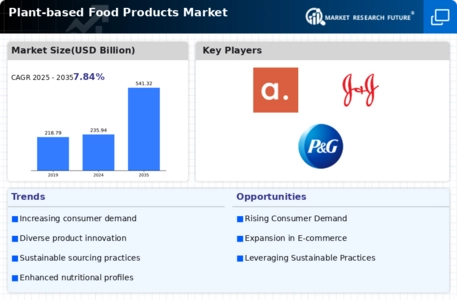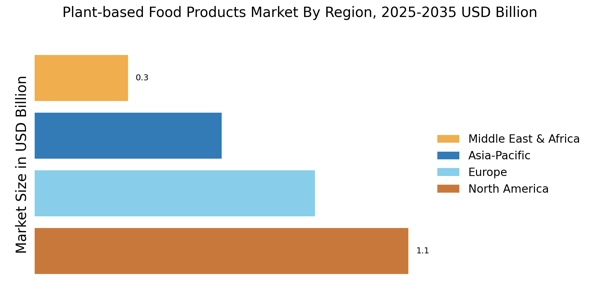North America : Market Leader in Innovation
North America is the largest market for plant-based food products, holding approximately 40% of the global market share. The region's growth is driven by increasing consumer awareness of health benefits, environmental concerns, and a shift towards sustainable diets. Regulatory support, such as the USDA's dietary guidelines promoting plant-based eating, further catalyzes this trend. The demand for meat alternatives is particularly strong, with a growing number of consumers opting for plant-based diets.
The United States is the leading country in this market, followed by Canada. Major players like Beyond Meat and Impossible Foods are at the forefront, innovating with new products and expanding distribution channels. The competitive landscape is characterized by a mix of established brands and emerging startups, all vying for market share. The presence of these key players enhances product availability and consumer choice, driving further growth in the sector.
Europe : Sustainable Growth and Innovation
Europe is the second-largest market for plant-based food products, accounting for approximately 30% of the global market share. The region's growth is fueled by increasing health consciousness, environmental sustainability, and government initiatives promoting plant-based diets. The European Commission's Farm to Fork Strategy aims to make food systems fair, healthy, and environmentally-friendly, which supports the plant-based sector. This regulatory framework encourages innovation and investment in sustainable food alternatives.
Leading countries in Europe include Germany, the UK, and France, where consumer demand for plant-based options is surging. The competitive landscape features established brands like Oatly and Quorn Foods, alongside numerous startups. The presence of these key players fosters a dynamic market environment, with a focus on product innovation and sustainability. As consumers increasingly seek healthier and more sustainable food choices, the plant-based market in Europe is poised for significant growth.
Asia-Pacific : Emerging Market Potential
Asia-Pacific is rapidly emerging as a significant market for plant-based food products, holding about 20% of the global market share. The region's growth is driven by rising health awareness, urbanization, and changing dietary preferences among consumers. Countries like China and India are witnessing a shift towards plant-based diets, supported by government initiatives promoting health and nutrition. The increasing availability of plant-based products in retail and foodservice sectors is also a key driver of market expansion.
China is the largest market in the region, followed by Australia and Japan. The competitive landscape is evolving, with both local and international players entering the market. Companies like Daiya Foods and Tofurky are expanding their presence, while local brands are innovating to cater to regional tastes. This dynamic environment presents significant opportunities for growth as consumer interest in plant-based diets continues to rise across Asia-Pacific.
Middle East and Africa : Untapped Market Opportunities
The Middle East and Africa represent an emerging market for plant-based food products, currently holding about 10% of the global market share. The region's growth is driven by increasing health awareness, urbanization, and a shift towards sustainable eating habits. Government initiatives promoting food security and nutrition are also catalyzing the demand for plant-based alternatives. As consumers become more aware of the benefits of plant-based diets, the market is expected to expand significantly in the coming years.
Leading countries in this region include South Africa and the UAE, where there is a growing interest in plant-based options. The competitive landscape is still developing, with both local and international brands exploring opportunities. Key players are beginning to enter the market, focusing on product innovation and catering to local tastes. As the demand for healthier and sustainable food options rises, the plant-based market in the Middle East and Africa is poised for substantial growth.


















